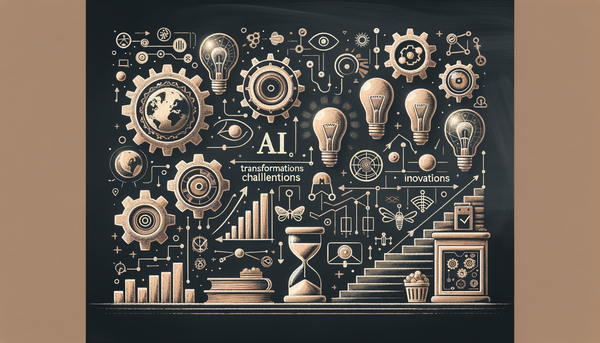Global Race in Artificial Intelligence: Recent Developments and Perspectives

This in-depth exploration of the current state of artificial intelligence delves into how Europe is mobilizing on a grand scale through public-private partnerships and massive investments, while ethical imperatives and regulatory concerns continue to shape the global debate. The discussion also highlights the contrasting approaches of major players like the US and UK in setting international AI standards, the push for balanced regulation to not stifle innovation, and groundbreaking advancements in technical methodologies such as distributed training. By bridging policy, ethics, and technical progress, this article offers a comprehensive synthesis of the latest developments in AI across continents and industries.
Europe’s Strategic Leap in the AI Race
In recent times, Europe has emerged as a disciplined and ambitious contender in the global AI race. Ursula von der Leyen’s launch of what is being hailed as the world’s largest public-private partnership represents a bold step, aimed at securing a frontline position in AI innovation. As detailed in EURACTIV, this initiative is not only about enhancing technological prowess but also about positioning the European market to reap the benefits of AI-driven transformation across a multitude of sectors.
This pioneering partnership underscores how Europe is leveraging the synergies between its governments, research institutions, and industry players to build a cohesive ecosystem. By nurturing a collaborative environment, Europe aims to address both the technical challenges and the ethical dimensions that come along with advanced AI deployments. The strategy is both evolutionary and revolutionary—evolutionary in the sense of gradual improvement through integration, and revolutionary as it promises sweeping changes that will influence global market dynamics.
Furthermore, the European commitment is clear with major financial backing. Recent moves include a whopping 50-billion euro boost as announced by von der Leyen, and a staggering $200 billion investment strategy outlined by the EU in another report on The Verge. These investments signal the EU’s unwavering commitment to not only catch up with but potentially outpace global competitors such as the US and China.
Such initiatives provide an optimistic outlook for new job creation, economic growth, and the birth of innovative AI solutions that are both ethical and sustainable. This comprehensive strategy forms part of a broader narrative at AI.Biz news segments like AI News Highlights and Revolutionizing Industries, which continuously track the seismic shifts in technological investments and leadership within the AI space.
Ethical Oversight and the Human Element in AI
One of the most profound challenges accompanying rapid AI development is finding the right balance between technological advancement and ethical governance. In an illuminating speech at the Paris Summit, Pope Francis urged for human oversight in AI decision making. As reported by Vatican News, this call highlights the risks of ceding too much control to autonomous systems and neglecting the intrinsic qualities of human judgment and morality.
The involvement of moral and religious leaders in the technical discourse of AI emphasizes a broader societal accountability. The concern is not limited to preventing negative outcomes but also ensuring a development trajectory that respects human dignity and values. Indeed, as one expert famously puts it,
"Everything that has a beginning has an end." – The Oracle, The Matrix Revolutions
Though this phrase is from a cinematic context, it serves as a reminder that the lifecycle of any technological trend—even one as potentially transformative as AI—must be oriented by careful stewardship and ethical boundaries.
In parallel, the regular updates from AI.Biz, such as the AI News Podcast, keep the conversation ongoing about how we might implement adequate safeguards while not impeding the innovation that AI promises.
The Global Debate: International Declarations and National Interests
The challenge of balancing innovation with ethical oversight extends to international policy and collaboration. Intriguingly, while the international community is increasingly coming together to establish guidelines for the ethical development and usage of AI, not all powerhouses see eye to eye. Both the United Kingdom and the United States have recently refused to sign a major international AI declaration, as outlined by BBC and further detailed in Reuters reports.
This refusal is rooted in a complex interplay of national interests, differing regulatory philosophies, and concerns about stifling innovation. The underpinning apprehension is that premature governance might hamper the technological progress that many see as essential to economic and strategic leadership. This divergence is discussed not only in global news summits but also forms a recurring topic in our global developments update at AI.Biz.
Critics argue that a “one-size-fits-all” international framework could undermine the ability of individual nations to pursue tailored research and development strategies that respond to local market nuances and cultural values. On the other hand, proponents of a global declaration insist that without a unified approach, unethical practices may proliferate and lead to undesirable outcomes in competitive national contexts.
On a related note, similar reservations were echoed in the discussions at the Paris Summit, where American commentator JD Vance voiced concerns that overly stringent regulations could “kill” the nascent growth of the AI sector. His remarks, as reported by news outlets such as CNN and Le Monde, provoke a necessary dialogue on finding the right regulatory equilibria.
JD Vance’s Cautions: Balancing Regulation and Innovation
At the recent Paris Summit, JD Vance brought his distinctive perspective to the table, warning government leaders against the perils of excessive regulation. He asserted that while regulation is essential to ensure fairness and mitigate risks, it must not become so restrictive that it suffocates the innovative potential of emerging AI technologies. CNN’s coverage of his statement explains that an over-regulated environment may delay or entirely block new initiatives that could lead to groundbreaking improvements in business and society.
Vance’s concerns are not isolated. The idea that regulators need to “crawl, then walk, before you run with AI agents” has resonated with experts in the field, a sentiment recently captured by ZDNet. Their recommendation is to gradually integrate AI solutions, allowing businesses to adapt strategically rather than being overwhelmed by disruptive change. This staged approach goes a long way in mitigating risks while allowing companies to build up competencies progressively.
Such cautionary opinions also mirror the broader public and private debate about innovation and responsibility. In the words of Reed Hastings, co-founder of Netflix,
"AI is a tool that will make our society more connected, more efficient, and more productive. We need to understand its implications and use it wisely." – Reed Hastings, 2016
This perspective reinforces the need for balanced policies that promote technology without sacrificing the foundational values that bind societies together. As discussions about the right approach to AI regulation flourish on platforms like the AI News Podcast, there is a growing consensus that successful AI integration will require both governmental foresight and industry experimentation.
Phased AI Adoption: A Pragmatic Path Forward
While debates over regulation and ethics continue, another important dimension of the AI narrative is the practical approach recommended for integrating AI into business operations. Experts suggest that companies should adopt a “crawl, then walk, before you run” strategy when it comes to implementing AI agents. The advice, prominently featured in reports on ZDNet, encourages organizations to begin with small, manageable projects, assess their effectiveness, and then scale up responsibly.
This prudent approach is especially critical given the high stakes involved. AI is not merely a software upgrade; it requires a cultural shift within organizations that impacts workflows, decision-making processes, and even the organizational structure itself. Early adopters have reported that by first testing AI capabilities in less critical functions, they can reduce the risk of large-scale failures while also refining the technology to meet specific business needs.
This measured strategy ensures that any potential issues can be ironed out without compromising the overall integrity of the business. By integrating AI incrementally, companies can document lessons learned, best practices, and ROI in real-time. Some organizations have already begun laying the groundwork, showcasing how AI can transform sectors ranging from finance to healthcare.
For those interested in further insights on how phased AI integration is reshaping enterprise strategies, our earlier posts on investment and leadership changes in AI provide additional context and real-world examples of successful implementation.
Breakthroughs in AI Research: Distributed Training and Beyond
Innovation within AI is not just limited to new business models and regulatory debates; breakthroughs in research are equally critical. DeepMind, for instance, is pushing the envelope with its work on distributed training for large AI models. As articulated in a detailed article from The Register, this technique divides the computational workload across multiple machines, thereby significantly enhancing training efficiency and accuracy.
The significance of distributed training cannot be overstated. Historically, the training of large neural networks has been a computationally intensive process, often limited by the available hardware capabilities. DeepMind’s approach not only accelerates the training process but also opens avenues for more complex and capable AI systems. This is particularly relevant in an era where demands on AI models are increasing exponentially—be it in natural language processing, computer vision, or other data-intensive applications.
Moreover, advancements like these are instrumental in maintaining the technological momentum that many economic actors are betting upon. Strategic investments from the EU and other global entities will likely dovetail with research breakthroughs, ultimately leading to a more diversified and resilient global AI ecosystem. It is an exciting era where collaboration between research and business is not optional but imperative, and the cross-fertilization of ideas is driving a renaissance in how problems are solved.
For the technical aficionados following these trends, detailed discussions on similar themes are available in our industry updates, shedding light on how technical innovations are transforming everyday business practices.
Tensions in Global Governance: National Priorities vs. Unified Guidelines
Alongside the technological advancements and internal regulatory debates, a significant concern on the global stage is the lack of consensus on how AI should be governed internationally. Both Reuters and BBC have reported instances where key players like the US, Britain, and even broader western coalitions are hesitant to commit to international declarations on AI. The reluctance is not so much about rejecting regulation altogether as it is about preserving national interests amid a rapidly shifting technological landscape.
The refusal by the US and UK to sign international AI declarations raises questions about the potential fragmentation of global norms. While more than 40 countries have committed to establishing ethical guidelines, the absence of these influential nations suggests a future where AI standards might vary considerably across borders. This discord could lead to challenges in interoperability, data exchange, and even trade disputes related to AI-driven technologies.
One cannot help but draw parallels to the early days of the internet, when fragmented standards led to compatibility challenges and stunted growth in certain regions. Today, as nations like those in Europe push forward with ambitious financial and strategic investments, there is a real risk that unilateral policies could fragment the global AI market. This scenario reiterates the need for carefully calibrated international dialogue—one that values both local sovereignty and global cooperation.
Nevertheless, the emerging picture is one of cautious optimism. The recognition that unified efforts can lead to safer, more beneficial outcomes is gradually permeating discussions in high-level circles, as well as in influential platforms such as the AI Global Developments podcast. As history has shown, breakthroughs in dialogue often follow lengthy periods of isolation and skepticism, making this a pivotal moment for global AI governance.
Balancing Growth with Caution: A Personal Reflection
I often find myself reflecting on how the rapid pace of technological change forces us to reexamine old ideas and adapt swiftly new ones. In many ways, the current AI landscape is reminiscent of past industrial revolutions where both wonder and wary caution were in abundant supply. While some celebrate the promise of AI with euphoric investment rounds and ambitious partnerships, others remain vigilant of the potential pitfalls of overregulation and misdirected policies.
These discussions remind me of a proverb frequently echoed in technical circles: "Science Fiction, is the last great escape." (A.R. Merrydew) Though originally a nod to the imaginative leaps of science fiction, it now resonates as a cautionary note to ensure we balance creativity with responsibility. Such introspection is necessary if we aspire to harness AI’s power for societal benefit rather than letting unchecked ambition lead us into uncharted and potentially hazardous territories.
The gradual approach advised by experts—from crawling to walking and eventually running—reflects a mindset that embraces experimentation yet remains grounded in pragmatic expectations. This philosophy is not only applicable to business as a whole but is also reflective of how nations and international bodies should plan their regulatory strategies. After all, technological revolutions demand both voracious ambition and deep-seated prudence.
For those who enjoy the human stories behind these sweeping changes, our segments on AI breakthroughs and cultural impacts at AI.Biz, including the Revolution of Industries series, offer narratives that bring these abstract debates into the realm of real-world impact.
Future Implications and the Road Ahead
The implications of these multifaceted developments extend beyond mere fiscal investments or regulatory debates; they shape the very contours of our future society. Europe’s aggressive thrust into the AI arena—through monumental investments and innovative public-private partnerships—may eventually ripple across not just technology sectors but also labor markets, social policies, and even international power dynamics.
In the coming years, we may witness a significant realignment of global influence as investments in AI research and infrastructure translate into new paradigms for productivity and economic growth. Large-scale distributed training models, as pursued by DeepMind, combined with a regulated yet vibrant ecosystem fostered by prudent international policies, could enable AI to tackle some of the most pressing challenges of our time—from climate change to healthcare disparities.
However, inherent in these advancements is the responsibility to continually reflect on the ethical dimensions and societal impacts of technology. The call by Pope Francis for human oversight serves as a wise reminder that at the heart of these technological marvels rests a human society that must not be overwhelmed by its own creations. The tension between ensuring robust support for innovation and preventing undue interference is delicate, yet crucial for a future that is both smart and humane.
This ongoing dialogue spans multiple forums, from high-level summits to grassroots discussions in technology forums, academic circles, and public policy debates. As nations like the UK and US cautiously weigh the benefits of international declarations against the need to protect national interests, the global community stands at a crossroads. Whether viewed through the lens of competitive strategy or ethical stewardship, the discussions we witness today will undoubtedly shape the policies and innovations of tomorrow.
As we continue to monitor these developments, it’s worth noting how media outlets and expert panels—like those featured on our AI.Biz podcast and news updates—play a critical role in informing and shaping public opinion. Their nuanced coverage of everything from investment trends to AI’s ethical dimensions helps distill complex debates into actionable insights for businesses, policymakers, and indeed, the entire global community.
A Call for Collaborative Progress
Looking forward, the future of AI appears to be a tapestry woven from threads of innovation, policy, research breakthroughs, and constant introspection. The insights shared by thought leaders—from venture capitalists like JD Vance, who advocate for fewer restrictions to enable growth, to advocates of measured progress who argue the importance of incremental implementation—highlight an essential truth: that progress in AI is only as good as the balance struck between ambition and accountability.
International collaborations and strategic investments must be harmonized with thoughtful regulatory oversight if AI is to fulfill its promise of transforming industries and enhancing quality of life. Without this equilibrium, the technology might either be overcontrolled to the detriment of its transformative power or left unchecked, risking unintended consequences.
In conclusion, while Europe charts an ambitious route with its robust financial commitments and groundbreaking public-private initiatives, the international landscape remains fragmented with divergent views on how best to harness AI. This complex interplay of financial might, moral guidance, and technical prowess ensures that while the race for AI supremacy is heating up, its ultimate outcome will be determined by our collective ability to blend innovation with wisdom.
For those who wish to stay updated on these intertwined narratives, additional stories and detailed analyses are continuously shared across AI.Biz channels. Whether you’re intrigued by the evolving regulations, captivated by novel research, or seeking insights on ethical AI, our platform unites these strands into a coherent vision for a future where technology serves humanity with both efficiency and compassion.
Further Readings
- Von der Leyen launches world’s largest public-private partnership to win the AI race - EURACTIV
- Pope to Paris Summit: Ensure human oversight of AI decision making - Vatican News
- UK and US refuse to sign international AI declaration - BBC
- Excessive regulation could ‘kill’ AI industry, JD Vance tells government leaders at Paris summit - CNN
- Crawl, then walk, before you run with AI agents, experts recommend - ZDNet
- US, Britain have not signed Paris AI summit declaration - Reuters
- EU's AI push to get 50 billion euro boost, says von der Leyen - Reuters
- JD Vance rails against 'excessive regulation' of AI at Paris summit - Le Monde
- DeepMind working on distributed training of large AI models - The Register




